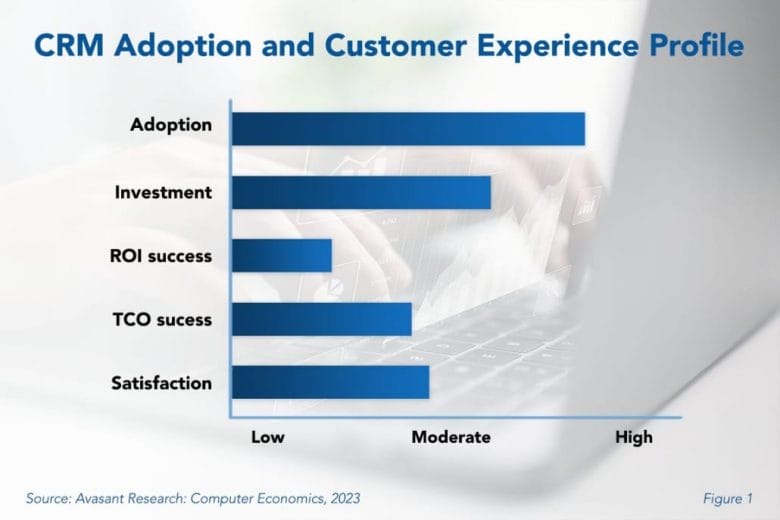CRM systems are one of the most widely adopted categories of enterprise applications. Modern CRM systems are essential for companies looking to improve their productivity and effectiveness in sales, marketing, and customer service. But investing in a new CRM system can be a messy business. At the core, a CRM system needs to interact with data across the entire business. Business processes should change to match the new capabilities, and people need to be trained on the new system. Hidden or unexpected costs can quickly add up, and missteps can result in a major setback, or worse, project failure.
As shown in Figure 1 from our full report, CRM Adoption Trends and Customer Experience, adoption is high, and the TCO experience and satisfaction for CRM are moderate compared with other technology trends in our study. However, despite this, ROI success is low.

CRM is a mature technology. These systems typically include functions such as sales force automation, estimating/quoting, configuration, marketing automation, customer call center, customer support or field service, social media monitoring, and other systems that directly support sales, marketing, and customer service. Customers continue to have growing demands, and new AI technologies are enabling CRM systems to do remarkable things. Two-thirds (66%) of companies taking our annual survey already have adopted some form of CRM, and nearly half of our respondents indicate that they are investing in new CRM technologies. So, if CRM is so mature, what’s the problem?
“CRM systems are known to involve complex implementations and major risks. However, as technology becomes more advanced, CRM systems will continue to be a focus for investment,” said Waynelle John, research analyst for Computer Economics, a service of Avasant Research, based in Los Angeles.
To get the most out of CRM, organizations should view it as a strategic investment, take steps to ensure implementation success, and encourage user adoption throughout the organization. Our complete recommendations for a successful deployment are in our full report. However, with any large deployment, it is advisable to start by thinking about the people. As noted in the full report, the greatest risk in a CRM project is that the company installs a new system, but line-of-business users do not actually adopt it in their daily activities. Sales personnel can be particularly notorious for their reluctance to share knowledge about new prospects or their daily communications. CRM systems are designed to make information on pending deals transparent and widely available throughout the management chain of command. It is important to recognize and address the people side of change required to make CRM successful.
The full report provides an overview of key concepts in this space. We also examine CRM adoption and investment trends, providing data on how many organizations have the technology in place, how many are in the process of implementing it, and how many are expanding implementations. We then look at the ROI experience, TCO experience, and which type of applications are the most popular.
This Research Byte is a brief overview of our study, CRM Adoption Trends and Customer Experience. The full report is available at no charge for subscribers, or it may be purchased by non-clients directly from our website (click for pricing).

